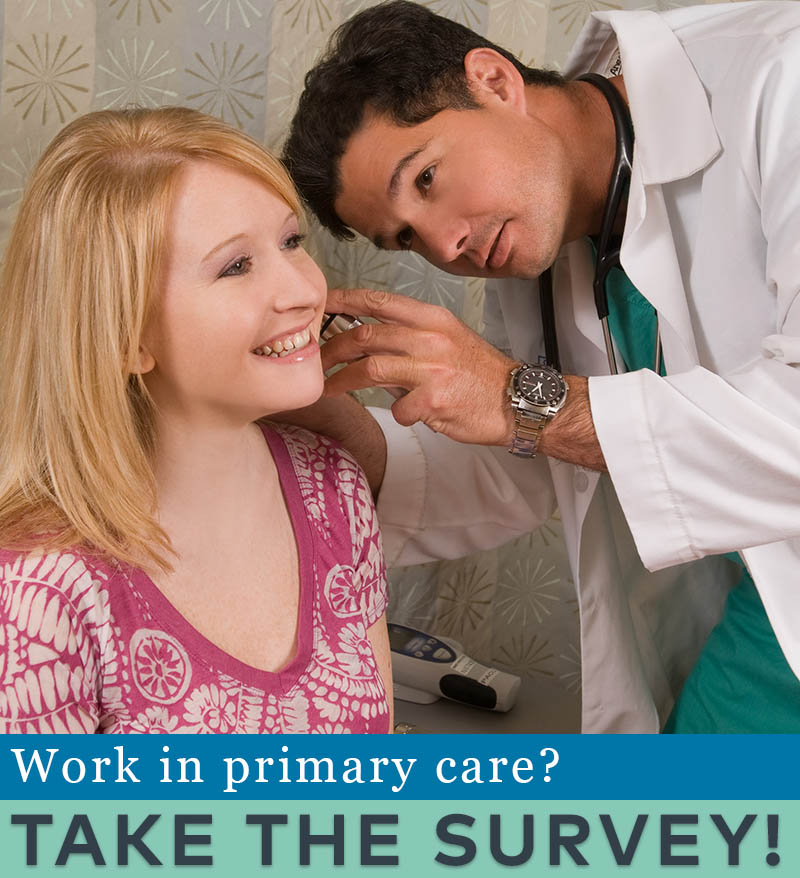You are looking at an archived version of our site. Please visit thepcc.org for a fresh, new experience!
You are here: Array » New Primary Care Surve ...
New Primary Care Survey Results Show Patients’ Physical and Mental Health Declining
WASHINGTON, October 5, 2020 – Patients’ physical and mental health is declining as nearly seven months of the pandemic take their toll, according to a new survey of primary care clinicians released today by the Larry A. Green Center, a research organization, in collaboration with the Primary Care Collaborative (PCC). Half of surveyed clinicians noted that the overall physical health of the population has declined, and 41% said the health of patients with chronic conditions is noticeably worse. A staggering 86% of clinicians reported a pandemic-related decline in the population’s mental health.
Primary care’s ability to handle these conditions is buckling. Only 1 in 5 surveyed clinicians reported their fee-for-service volume is within 10% of pre-pandemic levels, and nearly half (47%) agreed with the statement that despite a somewhat rosier economic picture, their clinical workforce is fragile. Heading into flu season, shortages of PPE (33%) and flu vaccine (13%) are also a major concern of clinicians.
The survey was conducted Sept. 18-21 and shows that, while the picture for primary has improved since April, the viability of practices is still at risk. More than a quarter (28%) of practices have permanently reduced the size of their staff because of COVID-19, and more than a quarter (26%) said at least a third of their practice’s work continues to be unpaid.
“Health care is the fourth-largest industry in the U.S. Its biggest arm by far is the one that handles close to half a billion visits every year,” said Rebecca Etz, PhD, co-director of The Larry A. Green Center. “Primary care is the solution we need to battle this pandemic, but we continue to stand by and watch the levees break.”
“Primary care is shrinking as we enter into flu season and a potential spike in COVID-19 infections. Disruptions to supply chains from hurricanes in the South and wildfires in the West have added to this bleak picture,” said Ann Greiner, President and CEO of the PCC. “Additional targeted support for primary care is needed from public and private payers to meet patient needs, including addressing vaccine hesitancy and the ability to get and administer vaccines safely.”
The survey was conducted by the Larry A. Green Center, based in Richmond, Virginia. The survey is part of a regular Green Center series to look at the attitudes of primary care clinicians and patients during the COVID-19 pandemic and the abilities of practices to meet patients’ needs.
The survey of clinicians received 445 responses from 45 states. 69% of respondents identify their practice as family medicine, 15% as internal medicine, 9% as pediatrics, 5% as geriatrics, 1% as mental health, and 1% as other. Settings include 24% rural, 12% community health centers, 7% in schools/offices, and 31% in designated patient-centered primary care homes. 31% have 1-3 clinicians in the practice, and 40% have more than 10 clinicians. 38% are owned by a health system, 33% are self-owned, 12% are independent and large-group, and 4% are government-owned. 8% are convenience settings, and 3% are membership-based.
###
Visit PCC’s website for:
- more details on the survey findings
- executive summary of the survey
Experts are available to provide insight and comment on the survey:
- Ann Greiner, president and CEO of the Primary Care Collaborative
- Rebecca Etz, PhD, co-director of The Larry A. Green Center
If you would like to speak with them, please contact Stephen Padre (Primary Care Collaborative's communications manager), spadre@thepcc.org, 202-417-3911
About The Green Center:
The The Larry A. Green Center for the Advancement of Primary Health Care for the Public Good is a research group founded by Rebecca Etz, PhD at Virginia Commonwealth University and Kurt Stange, MD, PhD at Case Western Reserve University. The Green Center works to reclaim and reconstitute the intellectual foundations of primary care, to advance the science of medicine learned and practiced within layered and competing social frameworks of meaning, and to deliver on a now 50 year old promise: better health and improved health care through a synergistic focus on both humanism and healing. We are nimble, inquisitive, curious, and open. We make personal doctoring and innovation visible.

Are you a physician, nurse practitioner, or PA working in primary care?
Help PCC and the Larry A. Green Center track how your practice is responding to the COVID-19 outbreak by completing the Green Center's occasional survey.
The regular surveys are no longer being conducted.
COVID-19 Updates
May 9, 2022 | Primary Care Collaborative
April 19, 2022 | Primary Care Collaborative
April 19, 2022 | Primary Care Collaborative
March 7, 2022 | STAT
February 27, 2022
- 1 of 39
- suivant ›
Recent News
August 16, 2024
August 12, 2024
July 16, 2024
May webinar highlights: “The Commercial Market: Alternative Payment Models for Primary Care” Nate Murray explains w… https://t.co/KX9Wi2w6oY —
Il y a 2 années 8 mois
@CMSinnovates’ primary care strategy is rooted in a 2021 @theNASEM’s report which called #primarycare “foundational… https://t.co/glbPxvCysg —
Il y a 2 années 8 mois
@CMSinnovates has a new #primarycare strategy, envisioning “ACO-based primary care model tests that may focus on pr… https://t.co/aJGF1z411l —
Il y a 2 années 8 mois
- Page 1
- ››
Secondary menu
Copyright © 2024 Primary Care Collaborative



